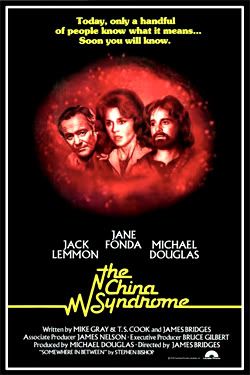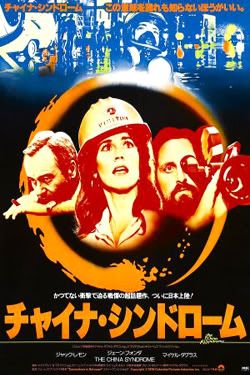← Back to Reviews
in
Plot – During a routine news piece, reporter Kimberly Wells (Jane Fonda) and her cameraman, Richard Adams (Michael Douglas) are caught up in an a near disaster at the Ventana nuclear power plant. Believing that they have stumbled upon a huge story, they find themselves frustrated when their story is blocked and denied at every turn. They find an ally however in the plant manager, Jack Godell (Jack Lemmon). He is all to aware of the dangerous situation they are in, but is the only one willing to acknowledge it. Even if doing so may risk his life.
So far during my 70s run I've come across a lot of recurring themes – anti-authority sentiments, cover-ups, conspiracies, paranoia, suppression of the truth etc. This film again features many of them. In particular this shares much in common with The Andromeda Strain, so much that it almost mirrors it, with the only change being from the issue of a virus of extraterrestrial origin to the issue of nuclear power. They both deal with the theme of man's reach exceeding his grasp and bringing about his own destruction though human error and complacency.
And just like The Andromeda Strain (and indeed a few others of late) the film comes close to resembling something of a docu-drama. It is able to aim for and achieve moments of documentary style realism, due in no small part to tight scripting and directing. The complete lack of score music just reinforces this tone, were even the closing titles roll by in complete silence. This is a film with a message, and the odd generic Hollywood moment aside, there is little light relief to be found.
The film is spearheaded by a great performance from Jane Fonda, and a truly wonderful showing from the legend that is Jack Lemmon. Each of them well deserving of the Oscar nominations they scored for their work. Fonda as the determined news reporter out to prove herself, and Lemmon as the plant supervisor who has a great dedication to his job but is smart enough to spot trouble, and who cannot quiet his conscience the way that others can. They are also supplied with some very strong support from Michael Douglas' impassioned cameraman, and Wilford Brimley as Lemmon's co-worker.
Lemmon's character is a great believer in nuclear power, and has great affection for the plant where he works. So to have to do what he does really tears him up. He doesn't want to hurt the industry he works in but feels he has no choice, eventually leading him to take drastic and explosive action. His performance, and the character he has taken on, just grows and grows as the film goes along. A truly superb actor delivering another in a long line of high quality performances.
Right from the start we are given a great introduction to Fonda's character and her motivations. We see her preparing meticulously for what seems sure to be a serious, hard-hitting piece of journalism. Only to have it revealed to be a puff piece about singing telegrams. Clearly this is a woman who wants to tackle serious news and believes she is more than capable, desperate to prove to everyone at the station she is more than just the 'redhead' as she is frequently referred to as. When this incredible story falls right into her lap, she is not about to let it go.
The film does not come across as a particularly neutral or objective work. It certainly seems t have chosen its side and set out its stall accordingly. It strongly questions the use of nuclear power and the precautions we have in place, as well as criticising those officials who place economic considerations above the safety of the public. It also seems to implicate the media who choose to cover-up the truth when threatened with legal action.
Particularly well handled is the initial accident which sparks everything off. We really feel the incredible, almost heart-stopping tension of the accident, due in large part to the wonderful performance of Lemmon. His anguished looks of desperation and fear, and eventual relief, really drag us into this predicament. Then after a slow (but nicely paced) build of the tension for about 90 minutes the last act of the film really ramps up the action and power as Lemmon's plant manager can no longer stay silent, choosing to aid Fonda in revealing the truth. As he does so however an element of deception and cover-ups come into play to try and stop him in his tracks. Realising what he is up against he takes matters into his own hands, creating a riveting and tragic conclusion
Just 12 days after this film was released there was the infamous accident at Three Mile Island. All of a sudden this piece of paranoid-drenched fiction was given an incredible seal of credibility. And sadly its message on the dangers of nuclear power are still very relevant over 30 years later, as we are just over a year away from the terrible incident that befell the Fukushima Nuclear Plant in Japan.
Conclusion – This is an intelligent and focused thriller that works both as a plausible story able to make serious points, while at the same time proving to be a gripping and enthralling piece of suspense. Its a storyline that could very easily be found on a TV movie, but is lifted high above that level by a number of impressive technical elements, not the least of which is the terrific acting.

|

|
Year of release
1979
1979
Directed by
James Bridges
James Bridges
Written by
Mike Gray
T.S. Cook
James Bridges
Mike Gray
T.S. Cook
James Bridges
Starring
Jack Lemmon
Jane Fonda
Michael Douglas
Jack Lemmon
Jane Fonda
Michael Douglas
The China Syndrome
Plot – During a routine news piece, reporter Kimberly Wells (Jane Fonda) and her cameraman, Richard Adams (Michael Douglas) are caught up in an a near disaster at the Ventana nuclear power plant. Believing that they have stumbled upon a huge story, they find themselves frustrated when their story is blocked and denied at every turn. They find an ally however in the plant manager, Jack Godell (Jack Lemmon). He is all to aware of the dangerous situation they are in, but is the only one willing to acknowledge it. Even if doing so may risk his life.
So far during my 70s run I've come across a lot of recurring themes – anti-authority sentiments, cover-ups, conspiracies, paranoia, suppression of the truth etc. This film again features many of them. In particular this shares much in common with The Andromeda Strain, so much that it almost mirrors it, with the only change being from the issue of a virus of extraterrestrial origin to the issue of nuclear power. They both deal with the theme of man's reach exceeding his grasp and bringing about his own destruction though human error and complacency.
And just like The Andromeda Strain (and indeed a few others of late) the film comes close to resembling something of a docu-drama. It is able to aim for and achieve moments of documentary style realism, due in no small part to tight scripting and directing. The complete lack of score music just reinforces this tone, were even the closing titles roll by in complete silence. This is a film with a message, and the odd generic Hollywood moment aside, there is little light relief to be found.
The film is spearheaded by a great performance from Jane Fonda, and a truly wonderful showing from the legend that is Jack Lemmon. Each of them well deserving of the Oscar nominations they scored for their work. Fonda as the determined news reporter out to prove herself, and Lemmon as the plant supervisor who has a great dedication to his job but is smart enough to spot trouble, and who cannot quiet his conscience the way that others can. They are also supplied with some very strong support from Michael Douglas' impassioned cameraman, and Wilford Brimley as Lemmon's co-worker.
Lemmon's character is a great believer in nuclear power, and has great affection for the plant where he works. So to have to do what he does really tears him up. He doesn't want to hurt the industry he works in but feels he has no choice, eventually leading him to take drastic and explosive action. His performance, and the character he has taken on, just grows and grows as the film goes along. A truly superb actor delivering another in a long line of high quality performances.
Right from the start we are given a great introduction to Fonda's character and her motivations. We see her preparing meticulously for what seems sure to be a serious, hard-hitting piece of journalism. Only to have it revealed to be a puff piece about singing telegrams. Clearly this is a woman who wants to tackle serious news and believes she is more than capable, desperate to prove to everyone at the station she is more than just the 'redhead' as she is frequently referred to as. When this incredible story falls right into her lap, she is not about to let it go.
The film does not come across as a particularly neutral or objective work. It certainly seems t have chosen its side and set out its stall accordingly. It strongly questions the use of nuclear power and the precautions we have in place, as well as criticising those officials who place economic considerations above the safety of the public. It also seems to implicate the media who choose to cover-up the truth when threatened with legal action.
Particularly well handled is the initial accident which sparks everything off. We really feel the incredible, almost heart-stopping tension of the accident, due in large part to the wonderful performance of Lemmon. His anguished looks of desperation and fear, and eventual relief, really drag us into this predicament. Then after a slow (but nicely paced) build of the tension for about 90 minutes the last act of the film really ramps up the action and power as Lemmon's plant manager can no longer stay silent, choosing to aid Fonda in revealing the truth. As he does so however an element of deception and cover-ups come into play to try and stop him in his tracks. Realising what he is up against he takes matters into his own hands, creating a riveting and tragic conclusion
Just 12 days after this film was released there was the infamous accident at Three Mile Island. All of a sudden this piece of paranoid-drenched fiction was given an incredible seal of credibility. And sadly its message on the dangers of nuclear power are still very relevant over 30 years later, as we are just over a year away from the terrible incident that befell the Fukushima Nuclear Plant in Japan.
Conclusion – This is an intelligent and focused thriller that works both as a plausible story able to make serious points, while at the same time proving to be a gripping and enthralling piece of suspense. Its a storyline that could very easily be found on a TV movie, but is lifted high above that level by a number of impressive technical elements, not the least of which is the terrific acting.
